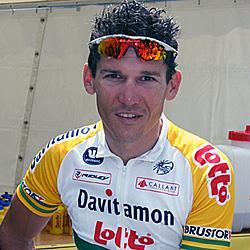
Recently on Cyclingnews.com |
An interview with Robbie McEwen, June 17, 2005
The psyche of a sprinter: Part II
McEwen talks about his expectations and ambitions leading up to the world's biggest bike race, and the struggles he's had with the now very heavily-contested points competition - as well as a few thoughts on the departure of Lance Armstrong. Click here to return to Part I.
CN: You mentioned a lack of base at the Giro; was it possible to build that base between the end of the Giro and the start of the Tour de Suisse?
RM: This gives me a better racing base. I haven't got the long, slow kilometres out training, because I just didn't have time, and that's why I did suffer during the Giro. Since the Giro, I took a few days off because I was sick and I made sure my body was recovered, and then I tried to start building up a little bit more. I did a couple of longer rides and a bit of work behind the motorbike just to simulate sitting in the bunch... and now this.
This Tour de Suisse just tops up the condition; the base is sort of there from the Giro, and now it's just improving that, practicing going deep. For example this morning, I tried to hang on to the first group over the top of the Cat. 3 - which I could - and even yesterday [on the climb, Stage 3], I just wanted to see where I was, sort of like a test, riding in the [front] group until I got the feeling in my legs that this is where I should stop, and seeing where I was.
CN: For the Tour, your goal is obviously to win as many stages as you can and to worry about defending your green jersey. Is the green something you aspire to win again - you've won it twice now - does it still motivate you?
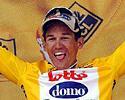
|
RM: Still love to win it, but the brutal honesty is that it's the most over-rated points competition in cycling. It's not always won by the best sprinter, but having said that, in 2002 and 2004 when I won it, I was the best sprinter of the Tour.
I wouldn't like to... let's say I wouldn't feel as good if I, say, won the green jersey without winning a stage - it just wouldn't have the same ring to it... [jokes] I think they should make a rule that you can only win the green jersey if you've won a stage!
Look at Cipo in '99 when he won four stages in a row - same thing with Tom Steels in '98, he won four stages and didn't win green - Petacchi won four in 2003 but he went home after a week... so the green jersey is not always about the best sprinter; it's about reaching Paris.
It's funny, though, isn't it? The green jersey's like, 'Ooh, you've got the green jersey!' But it still gets a lot of prestige and gets a lot of media attention, which is very important for the sponsors. It's true - my number one goal is to win a stage; once that's accomplished, try and win another one; and if you can do that, try and win another one - I've only ever won two in one Tour. And then you can sort of weigh it up in the first week and see if you're in contention... then you can start going for those bastard intermediate sprints.
CN: About those bastard intermediate sprints; do you like the strategy behind becoming the most consistent sprinter overall.
RM: I don't mind the whole strategy behind it... it's a bit of a mind game between your opponents and yourself. After a while, where you get into the last part of the Tour, where every little point counts, it often becomes a one-on-one battle... that simplifies things in a way, because you've only got one guy to watch. It's a good feeling if you know you're quicker, but it's weeks of stress.
Basically, you've got the stress of the first week, trying to win stages; then you say, 'right, now I'm in contention for green' - then you've got to start going for that - then it's two weeks of stress every single day.
Every stinking day, they put those intermediate sprints in those mountain stages... like, we're going for a sprint at the bottom of a 20k climb - they don't understand you're doing an absolute full effort, nearly popping you're eyeballs out of your head going for these sprints just to get another two point lead on your closest rival - then you've got to go uphill...
"then it's two weeks of stress every single day"-McEwen outlines just how tough the Green Jersey competition is |
People think, 'Oh yeah, sprint's done, that's that'; the thing is, you're straight out the arse, you've got to have team-mates like Gat [Nick Gates], who waits for ya, and then you've got to struggle up the first climb trying to get rid of the lactate up a 20k climb (laughs) - and then you've got another 160 in the mountains, just trying to get within the time limit! (more laughs)...
It's things like that, the things people don't see about the competition are the worst things. Just constant stress - you know there's only one winner of the green jersey - and you could come into Paris being two or four points behind... one guy's standing on the podium with the green shirt on, and the other guy's got nothin'.
CN: This isn't a question - but one of my most vivid memories was the final day of the 2002 Tour, the first time you won the green. You and Zabel were neck and neck all the way, but on one of the final intermediate sprints that was basically going to decide the competition, you got the better of him, and he looked over at you and smiled, but you didn't look at him for a while, before smiling also. It was like he had conceded victory...
RM: Almost conceded. I remember: it was an uphill sprint, the first one of the day, and we didn't do the one on the Champs Elysées the first time; yeah, I won that sprint fairly convincingly, and he looked across, smiled, and gave me this look of 'Well, I don't know what else to do!'
Although that's a look and it's one moment, but I knew 100 percent for sure that Zabel hadn't given up at that moment, because he absolutely, never gives up. He's the same sort of guy Hushovd is, and he didn't give up [last year] until... well, he didn't give up at all.
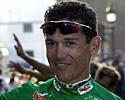
|
CN: The Tour will be missing Petacchi, but you will have a new rival who's openly indicated he wants to go for the green jersey, as well as stages - Tom Boonen. How do you feel about that?
RM: Well, the green jersey's there for anybody to win. I also read the stuff in the media, but I also know what Tom says about it; he's almost taken a leaf out of my book in saying that he's going to try for a stage win first and do all the sprints in the first week - I think they're going to be five - and after that, he says he'll see where he stands for green, and if I'm close, I'm going to go for it.
Which is pretty much the obvious thing to say, because so much can happen in the Tour; if you have a puncture or a crash in the final and miss some points, that can be the end of you. Last year, I had a big crash on Stage 6, but luckily that wasn't the end of my green jersey competition - it could've been, because I didn't score one point that day, but neither did Hushovd, and neither did Nazon, who were also both involved in the crash.
But the year before, I hit a patch of oil or something and Zabel crashed as well, and that was the day Petacchi won and Cooke got second, and there was like a 40 point swing in one day - I went from wearing the green jersey to being about 35 points behind. It's all those little thing along the way; so much can happen...
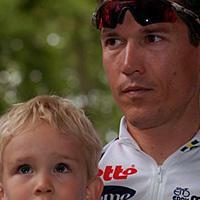
|
CN: When you're sprinting, does it bother you who you're up against? Do you find that you change your strategy depending on the competition; for example, do you feel the need to do anything differently going head-to-head with Boonen versus Petacchi?
RM: No, I pretty much ride every sprint the same; I think the thing about how I ride a sprint is that nobody knows what I'm going to do because I don't know what I'm going to do - and that's what probably makes me a difficult opponent. But it also depends on who's there and whose lead-out train is working the best. If Fassa is there, there's one place to be, because they pull so fast and they're so well organised, if you're not on Alessandro's wheel, then you haven't got much chance.
Last year at the Tour, you saw they couldn't manage to do that; the sprints were a little bit more unorganised and then you've got to be prepared to change [your] tactic at any given second. And that's sort of the way I ride: I look for the best option at any given second, and whoever's taking me in that final kilometre, I'll be telling them where to go and what to do... it's like sitting behind the wheel of the car - I'm just steering the person, telling them where to drop me off, where to take me or where to try and take me... and after that, I just try and find my way within the last k.
Everyone says you always find your own way in the sprint - that's maybe in the last couple of hundred metres, but there's way more that goes into a sprint than just that; it's the guys that have to get me up to that place and drop me off without having to hit the limit. I've maybe brought it on myself a little bit without a Fassa-style train, being able to win so much.
They say, 'You don't like a train?' That's not true - I'd love to have one - but it's not as simple as saying, 'Hey, let's make a train' (smiles). Watching on TV, there's that many people that say to me, 'Hey, why don't you just make a train like Fassa do?' (laughs) Why don't you make a paper plane and fly it to the moon?
CN: This Tour de France marks the end of the road for Lance Armstrong. Obviously, it's safe to say he's not one of your mates, but...
RM: Aww, he's alright, he's alright - we had one blue, which can happen to anybody...
CN: Well, it's someone you respect, regardless...
RM: Yeah, definitely.
CN: What impact do you think his retirement will have on the sport?
"I think what's he's done in the sport has had a big impact"-McEwen on Lance's retirement and what it means to cycling |
RM: Umm, that's hard to say... I don't know if his retirement will have a huge impact on the sport; it will have more of an impact on the Tour, and other general classification contenders, who will finally think, 'It's open slather... I'm up!'
You sort of get the feeling that there's been guys that have been waiting for him to go away. They're just thinking, 'I'm only young, I'm 25, 26; he'll go away soon, so then I'll start training seriously' (smiles)... it's like they're hanging on for that moment.
So I don't think his retirement will have a big impact on the sport in general. I think what's he's done in the sport has had a big impact, or the way guys prepare for the Tour, at least - but I think you can't have a huge impact on the sport, like Eddy Merckx has, without riding the season from February to October... winning the Giro and the Tour and the World's and World Cups and Paris along the way and a few other things as well. But you can't compare generations easily, either.
CN: For you, you're 32 now?
RM: 33 in 10 days...
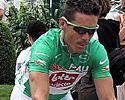
|
CN: Okay, 32 but 33 in 10 days. You've been on top of your game ever since 2002, the year you won the Australian Open road title for the first time and also your first green jersey, as well as a few stages of the Tour. What's changed for you since then - do you feel you're getting faster, stronger, smarter - or maybe a combination of these things?
RM: A combination of a few things. I don't think I'm really faster, but I can do it more consistently; I'm a bit stronger, but also consistently stronger... I've found over the last three or four years, I'm better at building up to an event and knowing I'm going to be good there.
I think my first years were a little bit more hit and miss... I often had things just before the biggest races that put me behind the eight-ball, like breaking my collarbone in May, and trying to get ready for the Tour - things like that. Having a knee operation in April, and trying to get ready for the Tour - that was in '97 and '99. I've also got a bit more clever, I train a little smarter and more efficiently.
CN: Is there any room for improvement?
RM: There's always room for improvement - but you don't always get the time to improve the things you think you could. And you've to work with what you've got; I'm constantly trying to improve, constantly trying to find a better way to do things.
Also the last few years, I'm surrounded more by people of my choice, which is a big help. When you've got team-mates that are prepared to ride through a brick wall for you, because they like to see you win and do a good job... the fact that I've got Victor Popov working for the team also makes a big difference for me. I'm almost 33; I'm not the youngest of the bunch any more, you demand a lot of your body - and you've got to treat it like a race machine. Michael Schumacher doesn't take his Ferrari down to the local garage for a service, and neither do I with my body.
CN: Speaking about bringing people like Victor and riders like Nick, like Henk, like Cadel onto the team, when did you decide you'd like to do something like this?
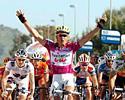
|
RM: Since I've been with the national team in '94, '95, I've wanted to ride with the same bunch of blokes. We had a good time as amateurs, we won a lot of races together, we've all evolved through the years - why couldn't we be in the same pro team now and do the same sort of stuff?
It's fair enough to expect that we can - just because Australia hasn't always been one of the cycling powerhouses doesn't mean we don't have good riders who can get the job done. Having said that, I get along great with the Belgian and Dutch riders, too, and I've had some great Belgian and Dutch team-mates.
Nick Gates: He's just a toppie! [top bloke - ed.]
RM: Yeah, I'm a toppie! (laughs)
NG: A self-confessed toppie! Yeah! (bellowing laughter all-round

